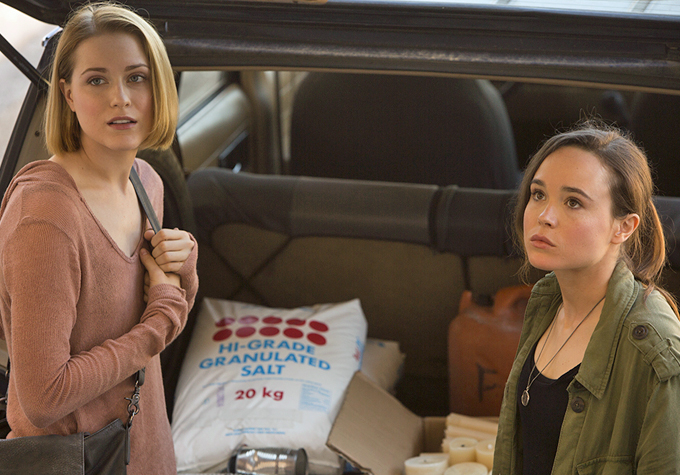 Patricia Rozema’s latest film “Into The Forest” begins in earnest with the end of the world. This is no fire-and-brimstone end of days, however. North America simply shuts down; wi-fi, phone signals, radio, electricity, all go kaput with no explanation provided whatsoever. Jean Hegland, the author of the 1996 novel on which the film is based, elided any exposition on the matter because the massive crisis is only there to serve as a crucible for a quieter, more intimate, and far richer sort of narrative. Instead of ogling skyscrapers that fall apart like Jenga towers, the film’s depiction of societal breakdown remains firmly planted in the realm of real human emotion, testing the resolve of two young women and unearthing awe-inspiring reserves of strength and tenderness in the process.
Patricia Rozema’s latest film “Into The Forest” begins in earnest with the end of the world. This is no fire-and-brimstone end of days, however. North America simply shuts down; wi-fi, phone signals, radio, electricity, all go kaput with no explanation provided whatsoever. Jean Hegland, the author of the 1996 novel on which the film is based, elided any exposition on the matter because the massive crisis is only there to serve as a crucible for a quieter, more intimate, and far richer sort of narrative. Instead of ogling skyscrapers that fall apart like Jenga towers, the film’s depiction of societal breakdown remains firmly planted in the realm of real human emotion, testing the resolve of two young women and unearthing awe-inspiring reserves of strength and tenderness in the process.
The pair in question are sisters Nell (Ellen Page) and Eva (Evan Rachel Wood), both on the cusp of adulthood, thrust into an abrupt coming-of-age by the mysterious cataclysm. It throws their tranquil day-to-day with their kindly father (Callum Keith Rennie) into disarray, pitting them against the simple struggles of life unplugged. Rozema establishes the enveloping power of nature early on, placing the women’s ubermodern home (all reclaimed wood juxtaposed with streakless glass and plastic, naturally) deep in backwoods three days removed from the nearest town. Their struggles begin with vanity — Eva’s desperate to use some of their precious gasoline to power the generator so that she might rehearse a dance routine with its musical accompaniment, if only for ten minutes — and work their way down Maslow’s pyramid until Nell’s disemboweling a sow in a last-ditch bid for some sorely needed vitamin B12. Challenges accumulate, some more daunting than others, and all conspire to reduce the two to the basest components of their personalities.
Nell and Eva make for a fine study in consistently shifting opposites. They exhibit the uncanny knack unique to siblings for being exactly what the other needs at any given moment. In a time of extreme vulnerability for Eva, a superhuman sense of cool-headed decisiveness overtakes Nell. Rozema captures their gentle symbiosis with a keen eye, conjuring just as much closeness from craisin-making as from a tight embrace. They disagree and fight, as sisters do, but the devotion between them is granite-solid. Page and Wood’s comfort around one another is truly remarkable; in the film’s clear standout sequence, Page bathes a nude Wood as she trembles like a leaf on a tree. Their verisimilitude as siblings suffers a bit from odd miscasting — there’s no way that Page is studying for her SATs — as well as the fact that Page and Wood don’t look like they could possibly share any DNA. For the most part, though, it’s easy to overlook this by virtue of their true-blue intimacy with one another.

The film has a regrettable habit of getting in its own way from time to time. An extended interlude with a boy (Max Minghella) that makes Nell go all heart-eyes-emoji should’ve been left on the cutting room floor, and the same goes for a teasing red herring past the hour mark. The script’s a bit buggy as well, and strangely so. Rozema appears to know just what to say at all times except when it counts; a pivotal character’s dying words land with a thud, delivered by a hand much heavier than the one guiding the rest of “Into The Forest.”
Rozema has found a fine talent in cinematographer Daniel Grant, to her credit. He’s faced with an unenviable task, forced to restrict most of the film to the walls of the family’s home without allowing the action to feel constrained, which is precisely what it is. For one, he combats this by taking full advantage of the swooningly lush forest that surrounds the home when Nelly and Eva venture out on supply expeditions, but even more crucially, he methodically establishes spatial relationships between the areas of the house. He lays groundwork sufficient to permit the camera to freely accompany Nelly and Eva throughout the building without the audience getting lost on the way.
During the Q&A following the film’s premiere at TIFF, Rozema, Page, and Wood all placed specific emphasis on the film’s position as a female-fronted, female-created product in a male-dominated landscape. Indeed, “Into The Forest” amply illustrates the vital need for female voices in the industry; Rozema possesses the insight and sensitivity to reimagine the apocalypse as a low-key trial of sisterhood instead of a race to avoid whatever deafening CGI eyesore might come next. Though not without its errors, “Into The Forest” turns a profoundly human eye to what just may be the very end of humanity itself. [B]
Click here for our complete coverage of the 2015 Toronto International Film Festival

